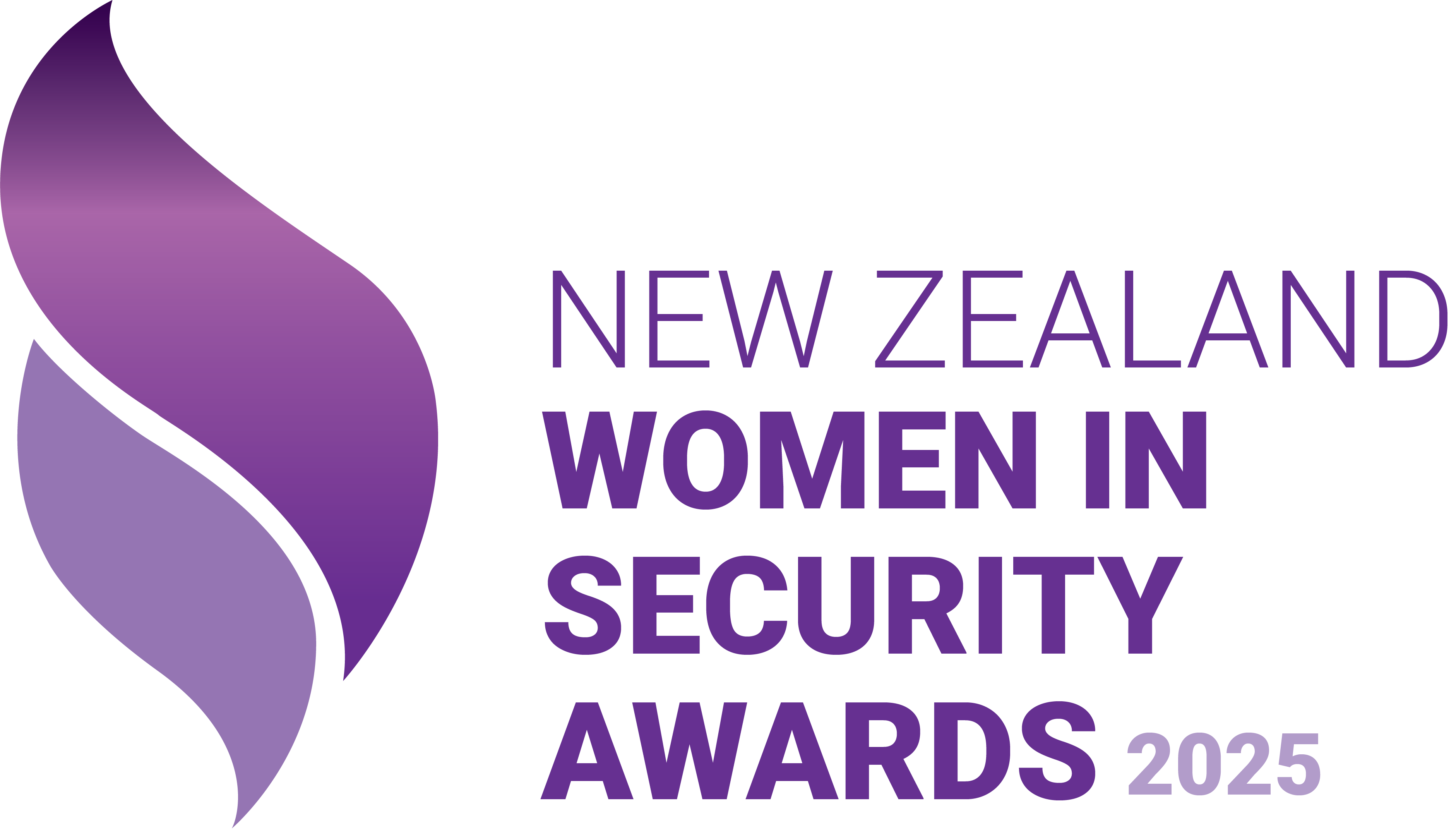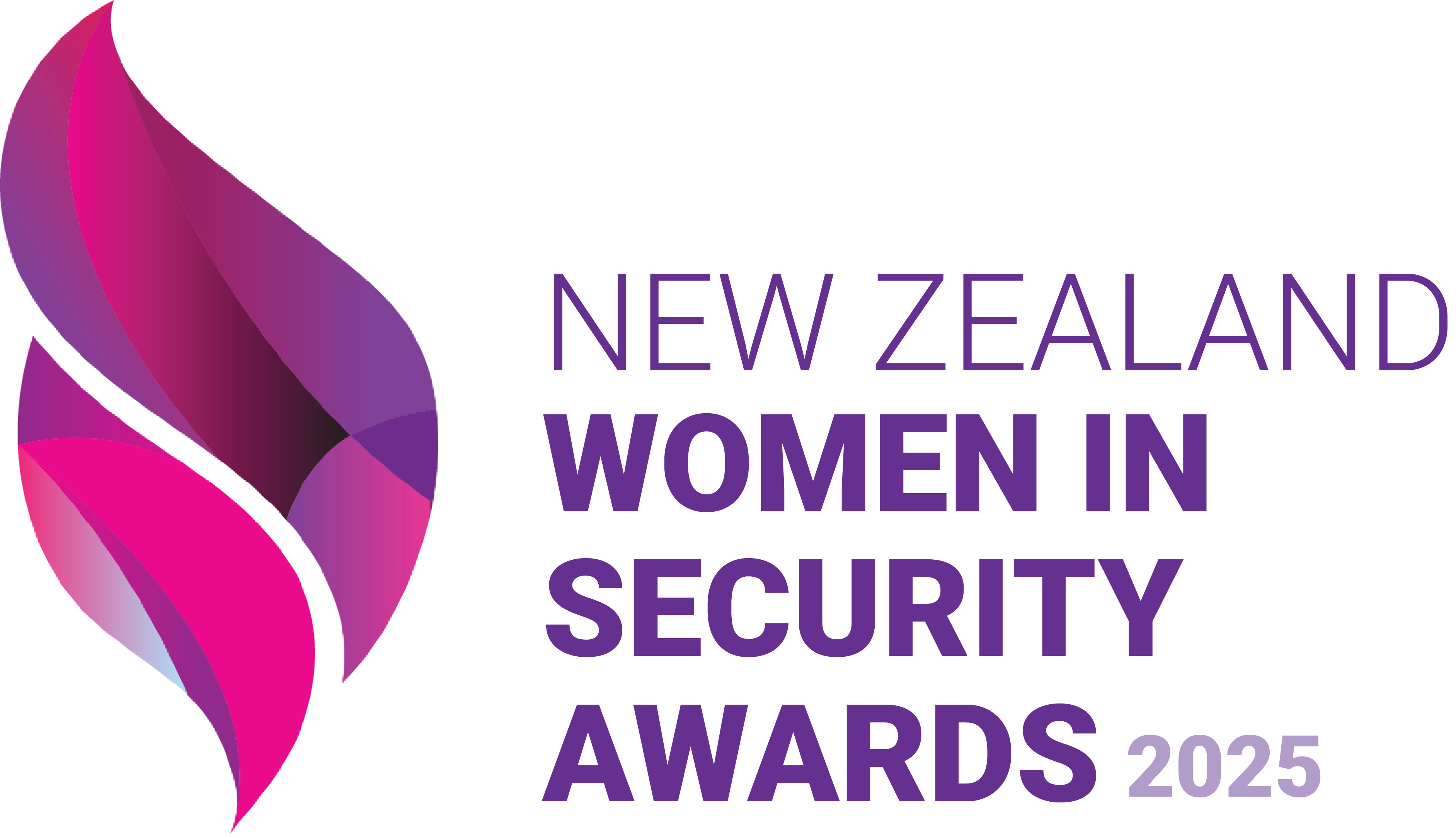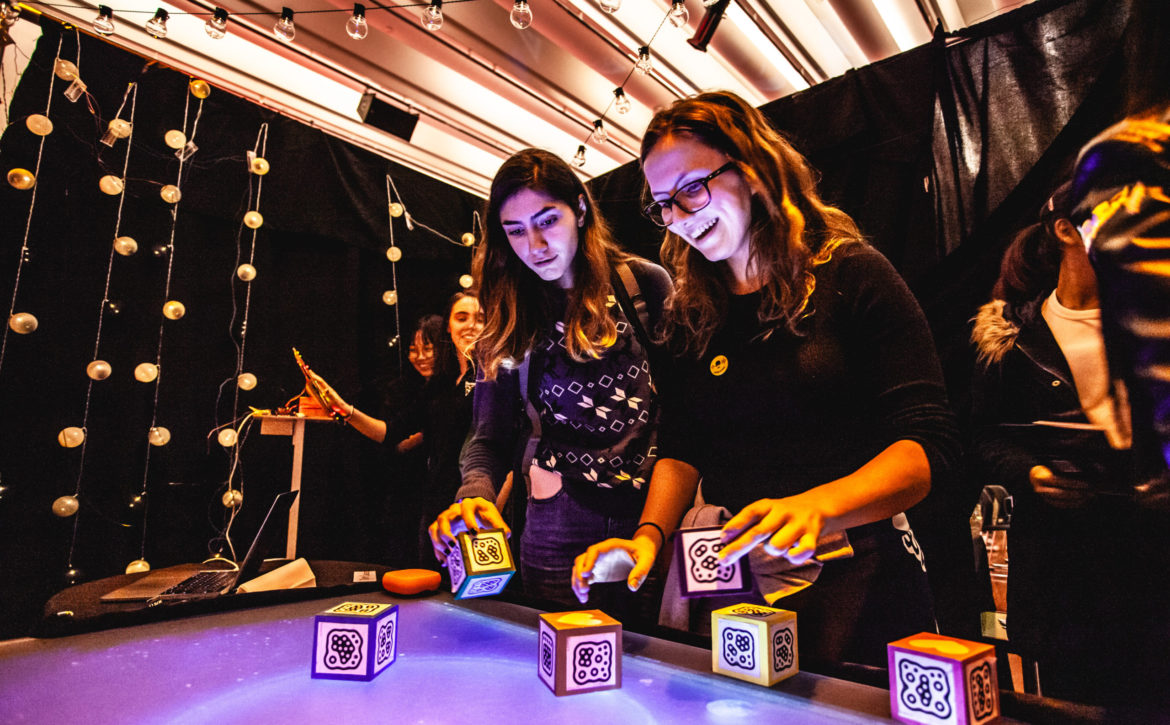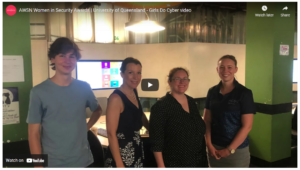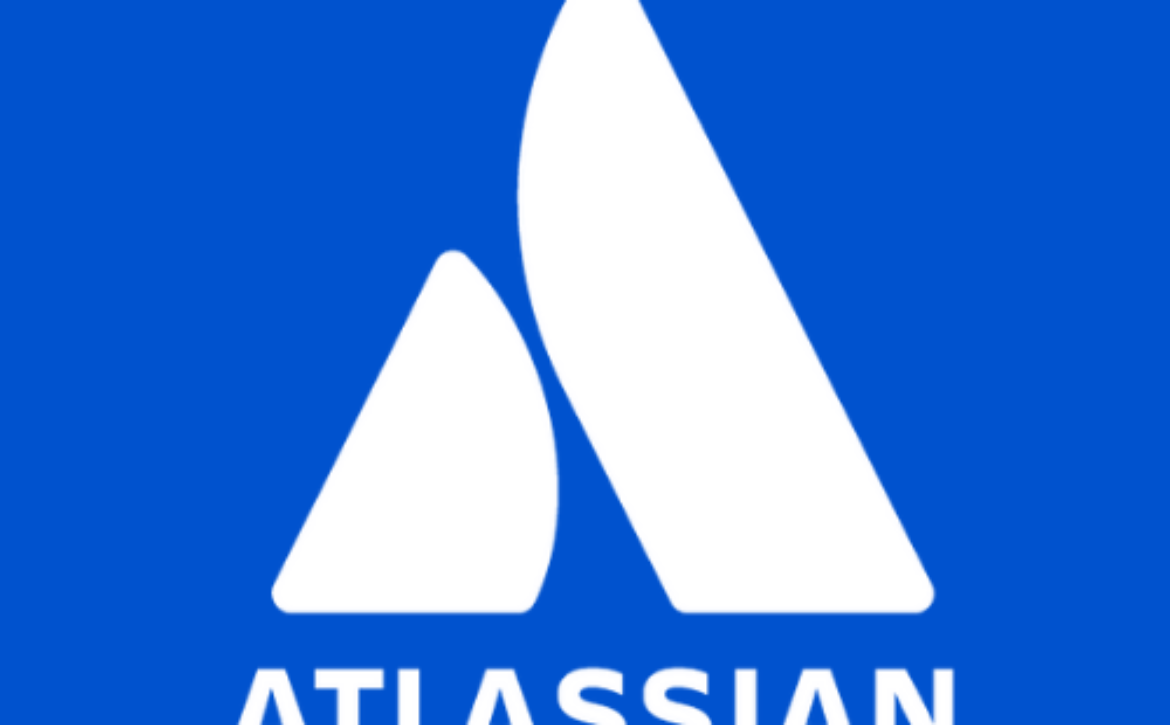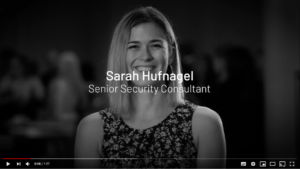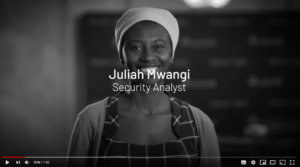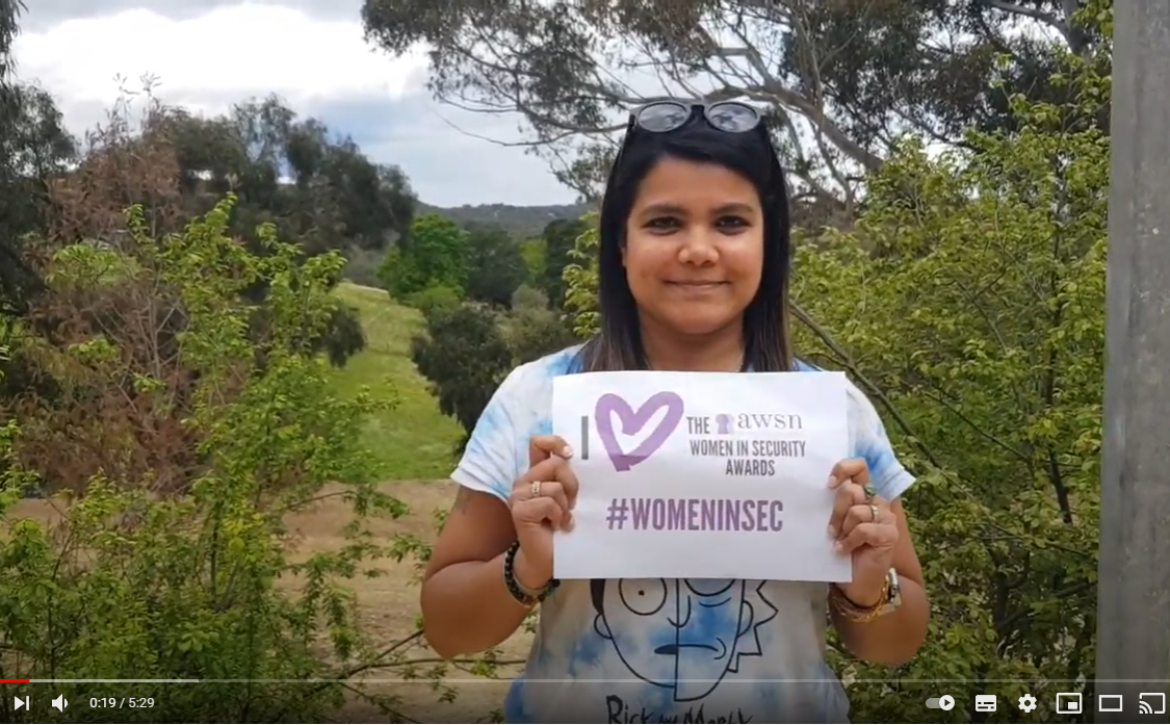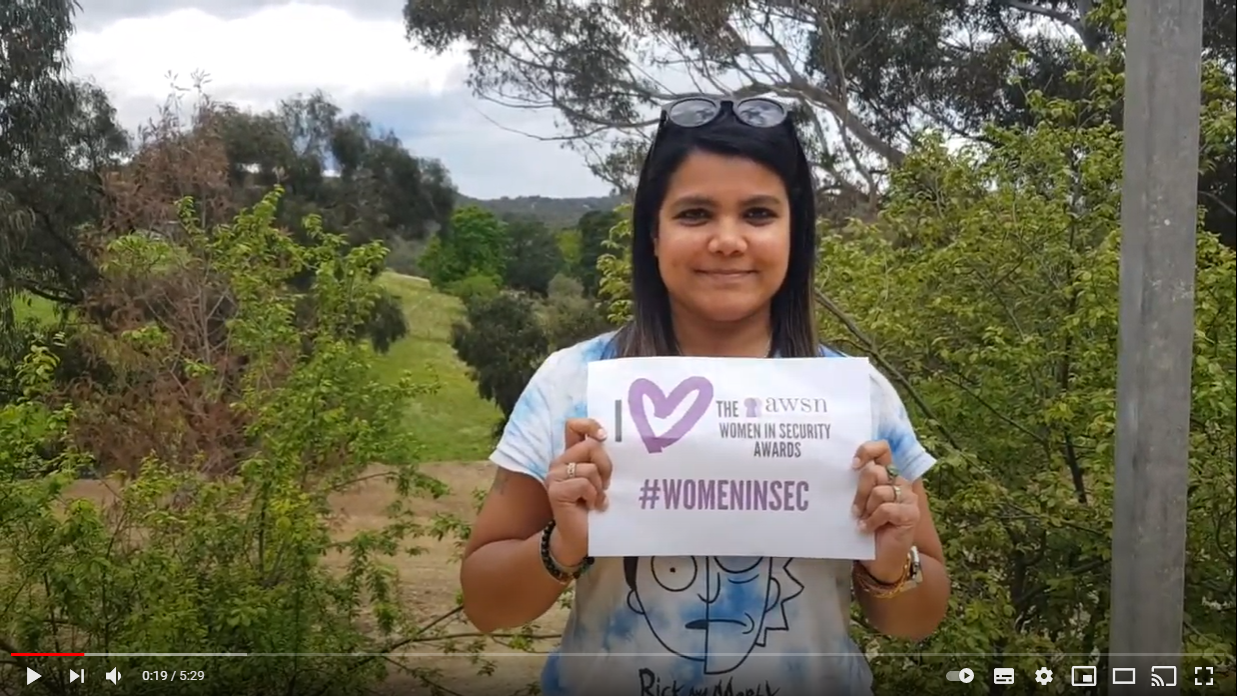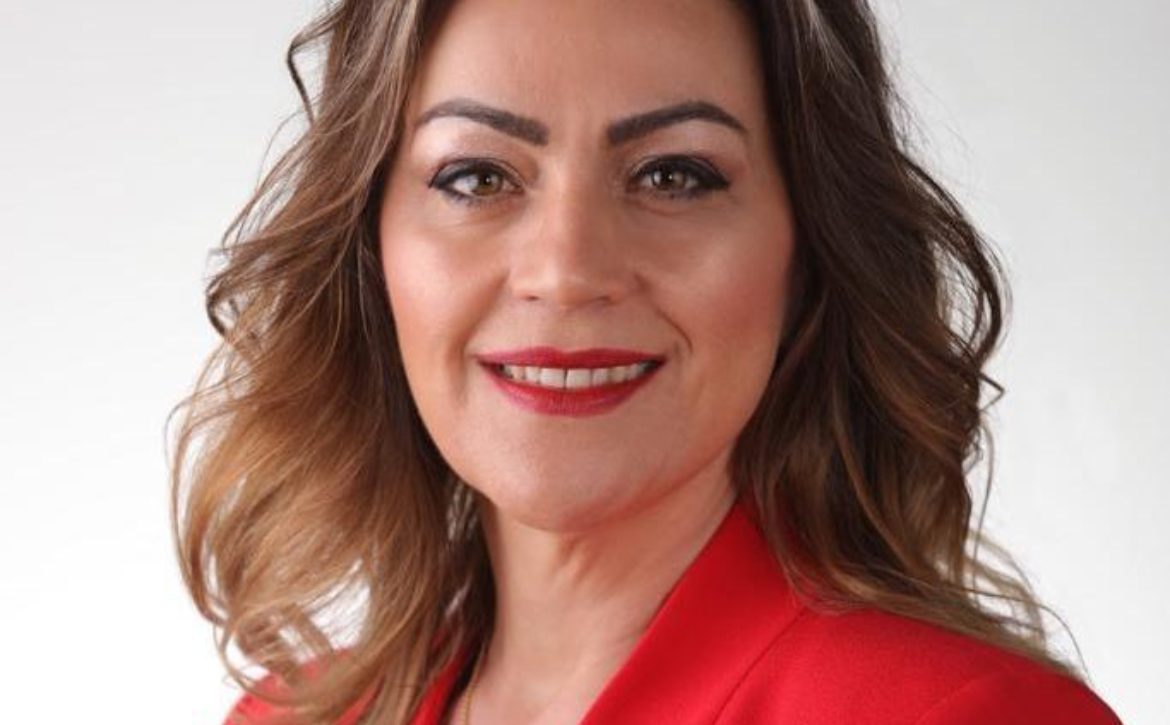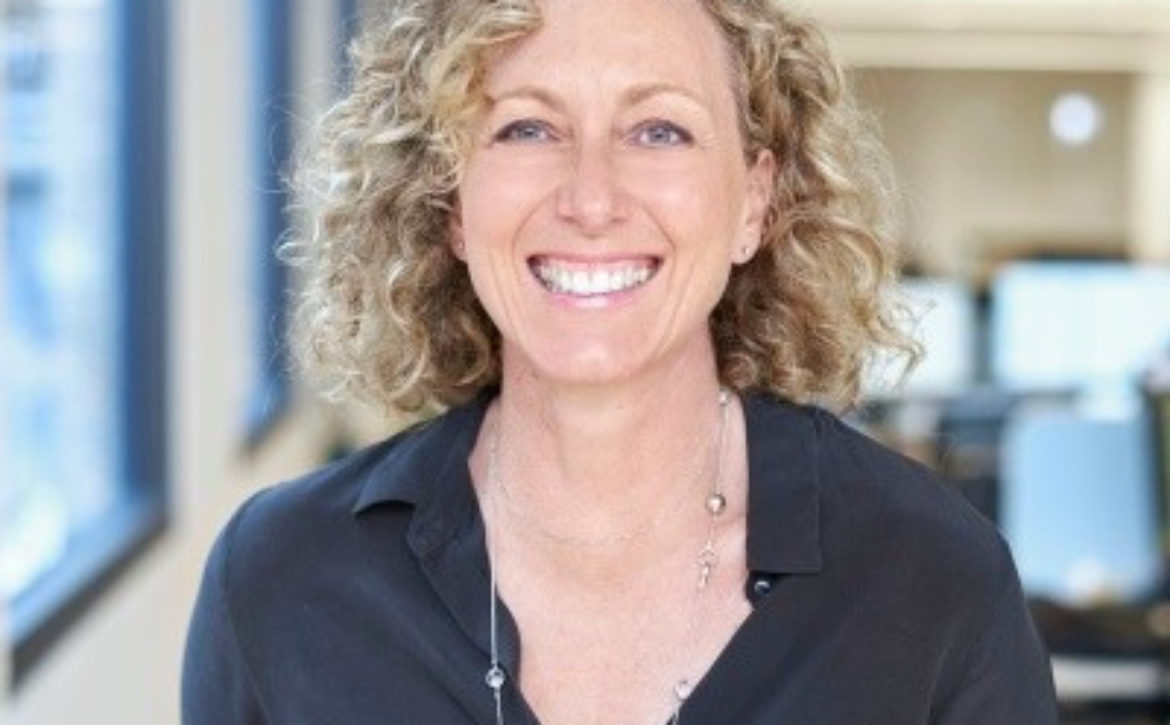The 2020 Australian Women in Security Awards finalists
2020 Australian Women in Security Award Finalists
Best Place for Women to Work in Security
- IAG
- nbn Security Group
- Penten
- WA Police Force

Best Student Security Leader
- Annette Peploe -Box Hill Tafe
- Taman Shergill -Telstra
- Skye Wu -Telstra

Best Mentors of Protective Security/Resilience
- Christina Keing – Deloitte
- Jen Johanson – RSM
- Nicole Stephensen – GroundUp Consulting
- Shazin Sohani – Westpac
- Siddiqua Shaheen – KPMG AU

Security Champions
- Annie Haggar – Accenture
- Elaine Muir – IAG
- Laura Jones – Transdev Australasia
- Shanna Daly – ParaFlare
- Shelly Mills – The University of Queensland
- Tara Dharnikota – Telstra

Best Female Secure Coders
- Cecile Bourguignon – IAG
- Chen Yu – IAG
- Rania Bilal – Australian Cyber Security Centre

IT Security Barrier Breakers
- Erin Howell – Trend Micro
- Jacqui Kernot – EY
- Melissa Misuraca – Kroll
- Shelly Mills – The University of Queensland
- Skye Wu – Telstra

Best Champion of Women in Protective Security/Resilience
- Amy Roberts – Assistant Director, Careers, Pathways and Inclusion
- Craig Walsh – Crown Melbourne
- Jodie Vlassis – Atlassian
- Rebecca Winfield – IAG
- Shey Dimon – Penten

AWSN Award 2020
- Daniella Traino – Pinecone Technology Strategies
- Heidi Winter – Kids SecuriDay
- Jo Stewart-Rattray – BRM Holdich
- Lesley Seebeck – ANU
- Michelle Price – AustCyber
- Project Friedmann

Male Champions of Change
- Darren Kane – nbn Australia
- Shane Moffitt – Department of Premier & Cabinet (VIC)
- Hai Tran – Australian Cyber Collaboration Centre
- John Paitaridis – CyberCX
- Matthew Wilson – Penten

Best Higher Education Program for Young Ladies in Security
- ECU- High Schools program for Cyber Security, Counter-Terrorism and Security and Intelligence
- Girls Programming Network – GPN
- Kids SecuriDay
- OxCC
- Schools Cyber Security Challenges
- UQ – Girls Do Cyber

Best Volunteer of Not-For-Profit Organisation
- Gladys Rouissi – ISACA Sydney Chapter
- Meidi Zhou van der Lee – Edith Cowan University
- Shamane Tan – Cyber Risk Meetups & Privasec

Most Outstanding Career Contributor in Protective Security/Resilience
- Christina Rose – SNP Security
- Kylie McDevitt – Australian Signals Directorate
- Tracey Hughes – Q1 Professional Services

The One to Watch
- Daisy Wong – Department of Premier and Cabinet
- Eshaal Ali – Student
- Hannah O’Neill – CyberCX
- Helen Sultana – Australia Post
- Jacynta Grigson – Edith Cowan University
- Melissa Crossman – Cryptoloc Technology
- Shamane Tan – Privasec

Best Security Certification Provider
- UNSW Canberra Cyber
- ISACA
- (ISC)2
Unsung Hero

Australia’s Most Outstanding Woman in IT Security
- Jacqui Nelson – Dekko Secure
- Jennifer Stockwell – Telstra
- Melissa Crossman – Cryptoloc Technology
- Minerva Livanidis – nbn
- Natasha Passley – IAG
- Victoria Krol – CyberCX

Australia’s Most Outstanding Woman in Protective Security/Resilience
- Heshani Haputhanthri – WA Police Force
- Bec Wilken – Zerorisk International
- Saira Buksh – Sydney Opera House
- Ash Fradley – nbn Co.
- Georgina Crundell – Ernst & Young
- Christina Rose – SNP Security
- Petrina Olds – Telstra
There are no secrets to success. It is the result of preparation, hard work, and learning from failure.
INTERVIEW: Removing barriers, at work and outside of it
Atlassian’s Jodie Vlassis warmed to cybersecurity at an early age, and never looked back
Jodie Vlassis traces her interest in technology back at least to the age of 12, when she would watch her brother “do some pretty cool things” developing software and decided she wanted to learn to do the same thing.
She learned Java programming at a young age and steadily moved towards cybersecurity, which she eventually realised she savoured “for the pureness of it”.
Cybersecurity is “constantly evolving,” she says. “It’s a fast-paced environment where there’s always something new to learn – and that’s something that really excited me, and that I really wanted to be a part of.”
Yet even at a young age, Vlassis says, she recalls that she “really knew cyber security to be very male oriented”.
While doing consultancy work with Deloitte, Vlassis ran into Atlassian representatives at an industry function – and, although she wasn’t looking for a job at the time, the new job opportunity arose – and she grabbed it with both hands.
“I was fortunate to have joined an organisation like Deloitte where there were other females around,” she says, “but when opportunities arise and you know they’re too good to refuse, you have to put yourself out there.”
Now working as Security Trust within the Trust and Security team in Atlassian’s Cyber Security SME, Vlassis explains that her responsibility “is to remove barriers, such as security blockers or any issues that may prevent customers or potential customers from growing with Atlassian.”
As someone supporting customers from the vendor side rather than the consulting side, Vlassis admits the new role has been a change – but in the end, she says, cybersecurity is cybersecurity.
“The foundation of cybersecurity doesn’t change” from role to role, she explains. “What changes is your end audience. But at the end of the day, we’re all here to achieve the same goal – to ensure that cyber security is at the forefront of every business, and we do that by building trust through security.”
The joy of mentoring
A nominee in several categories in 2019’s inaugural AWSN Women in Security awards, Vlassis was a finalist in this year’s Best Champion for Women in Protective Security/Resilience category.
It’s a badge she wears with pride, although she points out that she grew into the role rather than seeking it out.
“I’m not a traditional women’s rights activity by choice,” she says, “but because I have a role in the cybersecurity industry, it makes one me automatically – and I guess this is due to the lack of strong female leadership. As a result, I’ve become a de facto mentor.”
Mentorship has proven to be in her blood, Vlassis says: “it brings me a lot of joy knowing that if I can be present and help at least one person, then at least I know I’m doing what I’m meant to do.”
Her own career has been supported by mentors both in and out of her working environment, which she says has been invaluable by providing an unbiased opinion or point of view.
“But don’t have a mentor just for the sake of having a mentor or because everyone else has one,” Vlassis says. “You need to make sure that a mentor is going to help guide you, and help you become the best version of yourself – so you can provide that to the next generation.
She was given an opportunity, she says, “and if I can give back and pay it forward to someone, then I know I’m doing my job.”
Reaching out in a time of pandemic
The challenges of this year’s COVID-19 pandemic brought the role into finer focus, as the shift to isolated remote working fostered a greater emphasis on networking and one-to-one support.
“Since COVID happened, I feel like I’ve been given the opportunity to network more than ever,” she says, “and it has provided me opportunities to connect and mentor and support. It has opened up a new online world where we can now connect with anyone at any time – and I have enjoyed advising young women on how to make it in an industry where, unfortunately, women are still largely marginalised.”
That situation has changed in recent years, she adds, through greater advocacy for women in cybersecurity roles and the greater attention that many executives are paying to issues around gender equality and representation.
Longer-term institutional change, however, will take time – and broad buy-in.
”In my years in boardrooms I can attest to the underrepresentation of women– and it’s a systemic problem that definitely needs to be changed,” she says.
“Boosting economic and job opportunities for women, and marginalised groups, needs to be part of the solution,” she says.
”But It’s not just a one-person solution, it’s an everybody solution – and by increasing awareness within our workforce, expanding and creating mentoring opportunities, and forging women-oriented communities, we can really ramp up female representation.”
It’s not just a one-person solution, it’s an everybody solution – and by increasing awareness within our workforce, expanding and creating mentoring opportunities, and forging women-oriented communities, we can really ramp up female representation.
INTERVIEW: Building cyber culture into the business from day one
CyberCX’s Snezana Jankulovski is helping combine 15 companies into one – so what could possibly go wrong?
Late in 2019, the founding of CyberCX created a major player in Australia’s cybersecurity industry overnight. Twelve different cybersecurity consultancies coalesced into one firm with more than 500 cybersecurity professionals spread across more than 20 offices in Australia, New Zealand, Europe and the United States.
Since then, CyberCX has gone from strength to strength – adding three more companies and drawing on its consultants’ collective decades of expertise to support clients in areas such as strategy and consulting; security testing and assurance; governance, risk and compliance; identity and access management; digital forensics; and more.
Snezana Jankulovski has been with CyberCX from the beginning – and, as the company’s chief people officer, she has taken on the challenge of integrating 15 different company cultures into a single, unified whole.
“I’ve been literally starting from ground zero,” she says, “in building a scalable people and culture function – and an amazing workplace experience – for an organisation that didn’t even exist 12 months ago.”
Given the range of businesses and sizes – the member organisations had between 3 and 90 staff each – it was a challenging task but one, she says, that was facilitated as she and the transition team discovered broad commonality in the companies’ workplace philosophies.
“We were very selective and brought together organisations that are the best at what they do,” she explains, “and they were very similar in terms of their cultural characteristics.”
“Through that process I saw that so many of these organisations had so much in common,” she continues. “They were all obsessed about customers and delivering great solutions, and worked so well together – which just made our job so much easier in terms of bringing them together.”
Equipped for change
The novelty of CyberCX as a merged organisation gave Jankulovski scope to build a culture that embodies workplace ideals around gender equality and equal representation.
“We made a commitment very early on in our journey that diversity was a key part of who we are,” Jankulovski says, “and committed to create an inclusive workplace irrespective of gender or other attributes.”
As someone with extensive expertise in change management – she is a Prosci Certified Change Practitioner who has previously worked in people and culture roles with organisations like Cox Automotive, Dimension Data and Telstra – Jankulovski was well equipped to guide CyberCX through a period of rapid change.
Yet just as employment contracts were formalised, policies harmonised, payroll in place and the new corporate culture emerging, the COVID-19 pandemic hit – and the executive team’s priorities shifted towards a singular focus on supporting staff safety and efficiency at homes.
“We had to work very quickly to put those things in place,” Jankulovski recalls, “and we had to produce policies that might normally take months to refine, overnight.”
This also included introducing additional leave days, supporting locked-down staff with care packages, and refining the way that project teams worked together – addressing tasks such as regular communication, ensuring regular stand-ups via videoconferencing, and engaging with staff through regular virtual ‘town hall’ meetings attended by the senior executive team.
“We were determined that everybody would work through the pandemic and that we would survive,” she says, “and we did that by managing the transition virtually. My prior roles very much equipped me to manage massive, large scale change – but at the end of the day, it’s all about communication.”
Yet for all its organisational challenges, the pandemic also saw a surge in demand from customers seeking to secure their own remote-working transitions – and this not only helped CyberCX grow quickly, but helped Jankulovski bed down the organisation’s cultural dynamics based on what was proving effective and valuable.
Building an inclusive culture
Managing the shift to virtual working was an unexpected challenge, but it did help lay the foundations for the flexible work models that are tied to ideals around workplace gender equality.
“It really helped us reinforce our commitment to flexible working,” Jankulovski says, “and this is something I and the executive are very committed to – because if we’re going to be able to attract the best people and most diverse workforce, we’ve got to embrace it.”
CyberCX launched a formal diversity strategy on International Women’s Day this year, committing to promoting the engagement of women in cyber and sponsoring organisations such as AWSN.
The company has sponsored cyber scholarships for women studying cybersecurity, and the board tracks gender diversity as a key performance metric of the business. In February, the company will also welcome a cohort of 15 cybersecurity graduates – with an even split of men and women – participating in its first cybersecurity graduate program.
Through these and other initiatives, Jankulovski believes CyberCX has been able to embrace diversity as a core business issue that will serve it well as it continues to grow from strength to strength.
“We’ve got a lot more to do,” she says, “and we are nowhere near where we want to be. We want to see more women in leadership roles, and to see our numbers increase – but there is no silver bullet.”
“The key is to understand that gender diversity is a business issue, not a gender issue. It’s something that we’re absolutely committed to – and it’s a no-brainer because diversity brings huge benefits.”
AWSN 2020 Women In Security Awards: Recognising Excellence in Security
The challenges of this year may have kept us apart, but that didn’t stop hundreds of cybersecurity industry luminaries from coming together online to celebrate the most innovative, effective and generally outstanding women in Australia’s cybersecurity industry.
Held online on Tuesday 13 October, the AWSN 2020 Women In Security (WiS) Virtual Awards were a collaborative effort spearheaded by Australian Women in Security Network (AWSN) founder Jacqui Loustau and Source2Create co-founder Abigail Swabey.
Frustrated by the failure of current industry development pipelines to meaningfully increase representation of women in the cybersecurity industry, Loustau and Swabey launched the awards in 2019 as a way of recognising the women making amazing contributions to the industry every day.
Like their colleagues, those women have been pushed harder this year than ever to maintain the security of rapidly changing organisations despite a surge in the frequency and intensity of cyber attacks.
Despite this extensive disruption, this year’s awards received 437 nominations spanning 20 categories of achievement including protective security/resilience, secure coding, higher-education programs, mentorship, volunteering, and other areas where women are helping break down barriers for themselves and others.
The awards attracted the strong support of major cybersecurity industry companies including CyberCX, Secure Code Warrior, and Atlassian – each an Australian success story that has led by example when it comes to increasing the representation of women.
A judging panel of 16 independent cybersecurity industry experts, working across a range of industries, narrowed the entries down to shortlists and, then, a complete list of 80 finalists.
“We’re honoured to have this exceptionally talented group of judges with vast experience and knowledge across private, public and academic circles,” Swabey said, “to help us recognise and celebrate the most outstanding achievements of women, men, and organisations across Australia.”
“Their dedication and commitment to the AWSN Women in Security Awards not only gives back to the community, but also empowers women today and into the future.”
Finalists were acknowledged over the course of the ceremony, which was hosted by leadership and neuroscience expert Vannessa McCamley, who had years of experience in the cybersecurity industry before embarking on her own consultancy.
By the time the last finalist was announced, the second annual AWSN awards had become a roll call of Australia’s most successful, inspiring, motivating cybersecurity pioneers – the women who have made a difference by excelling at their roles, engaging with their peers, encouraging those around them, and paving the way for other women to participate in the dynamic and ever-challenging cybersecurity industry.
The AWSN Women in Security Awards will return next year, with a gala dinner and awards ceremony planned for 13 October 2021. Keep the night free!
Finalists and winners for this year’s WiS awards included:
Best Female Secure Coder
Recognises the women who has excelled in developing computer software in a way that guards against the introduction of security vulnerabilities. This might be because of exceptional team participation or leadership, or by championing secure-development methodologies like DevSecOps.
Winner: Chen Yu
Chen Yu is a Specialist Engineer in the Adaptive, Response and Engineering Team within IAG’s Cyber Defence and Response Team. Her responsibilities include developing cyber threat detection logic, automation and orchestration tools. She has played a key role in IAG activities including a data loss protection system and the recent development of a ServiceNow workflow that identifies new regulations and obligations required to maintain IAG’s compliance. She played a vital role in onboarding Office 365 logs, which involved logic development of anomaly detection to increase visibility and efficiency improvements by automating a proxy.
Finalists: Rania Bilal, Cecille Bourguignon
AWSN Award for 2020
Recognises the accomplishments and contributions of an individual or company, that is making a real difference and reshaping the security landscape.
Winner: Michelle Price
In her years as CEO of AustCyber, Michelle has demonstrated professionalism, innovation, and leadership with a high level of grace. Her many innovative initiatives have been carried out in an inclusive way, as she challenges the status quo in a constructive way and strives for greatness in herself, and those around her. Michelle has been strongly supportive of young people – women in particular – to help them feel comfortable around new technologies and confident to pursue their interests and passions. She not only inspires people, but has the respect of anyone that works with her.
Highly Commended: Jo Stewart-Rattray
Jo’s tireless dedication to the IT security industry not only in Australia, but globally. She is a demonstrated leader, passionate about the IT security industry and has spent her life’s work educating and mentoring others to inspire future generations of professionals.
Finalists: Professor Lesley Seebeck, Project Friedman (Louisa V, Louise P, and Emily Edgeley), Daniella Traino, Heidi Winter
Best Higher Education Program for Young Ladies in Security
Recognises an individual or organisation who has effectively used the power of learning – through teaching, lecturing or training activities – to educate others about cybersecurity threats.
Winner: Schools Cyber Security Challenges program
Led by the Australian Computing Academy within the University of Sydney, the Schools Cyber Security Challenges are the only curriculum-aligned security skills program targeting schools. By supporting high school teachers to teach cybersecurity concepts and promote careers in the field, the challenges engage students with strong content and industry mentorships that convey the possibilities that the cybersecurity industry offers. Over 100,000 Australian students – 49 per cent of whom identify as females – have enrolled in the program to date.
Highly Commended: Girls Do Cyber program (University of Queensland)
Special Recognition Award: 0xCC, run by Alannah Guo
Finalists: Girls Programming Network, Kids SecuriDay, High Schools program for Cyber Security, Counter-Terrorism and Security and Intelligence (Edith Cowan University)
Best Volunteer or Not-for-Profit
Recognises the volunteer or not-for-profit organisation that is going ‘above and beyond’ to advance the cybersecurity and safety of the Australian public as well as businesses and governments in Australia.
Winner: Gladys Rouissi
Long a quiet achiever in the not for profit space, Gladys is a director and the current ambassador for SheLeadsTech for the ISACA Sydney chapter. Over the past three years, she has delivered multiple successful International Women’s Day events, and has focused relentlessly on delivering opportunities to women in security. Gladys is been integral in developing programs for the chapter focusing on gender equality and supporting women in our industry, both as a mentor and through her positions with industry organisations such as the Risk Management Institute of Australia and Australian Computer Society. She understands the benefits of sharing her experiences and has been driven by giving back to the community.
Finalists: Shamane Tan, Meidi Zhou Van Der Lee
Most Outstanding Career Contributor in Any Area of Security
Recognises the individual with an outstanding work record and long history of innovation in the field of security/resilience. Applauds the individual who has excelled at uncovering and addressing threats and vulnerabilities, and made significant contributions across a long and productive career.
Winner: Kylie McDevitt
As a technical director with the Australian Signals Directorate, Kylie is a passionate, humble role model who supports her peers, actively mentoring and supporting women in the IT security industry. She was the first female casual lecturer in cyber at the University of NSW Canberra, and was also the first female technical director with the Australian Cyber Security Centre (ACSC) – where she drove the technical and strategic direction of the Emerging Technology & Engineering section. Kylie’s time at the ASD also included a campaign to revise the gender language of that organisation’s Information Security Manual – something that has been emulated by similar organisations internationally. Kylie runs B Sides Canberra, considered to be the largest hacker forum in Australia; taught cyber defence postgraduate training at UNSW Canberra and moved half the course online due to COVID-19 restrictions; and has run C Sides monthly security meetups for the past seven years – even continuing them as a virtual offering that attracted 100 people per month throughout the COVID-19 pandemic.
Finalists: Tracey Hughes, Christina Rose
Most Promising Newcomer in Any Area of Protective Security/Resilience
Recognises the ‘rising star’ of the protective security/resilience industry that is already making a significant contribution to the protective security/resilience landscape. Highlights their unique capabilities and contributions as they continue to grow in stature, and gain more and more recognition.
Winner: Amanda Pitrans
At just 26 years old, Amanda is only starting her career but she has already demonstrated incredible promise. As a protective security analyst in IAG’s Group Protective Security (GPS) Team, Amanda was critical to that company’s response to the COVID-19 pandemic – working with GPS and IAG’s COVID-19 Crisis Response Team to protect its nearly 13,000 employees. Amanda has a Master of International Security Studies, with a specialisation in terrorism and counterterrorism operations, and is actively engaged with organisations such as the ASIS International Young Professionals Network. She is also Chapter chairperson of the NSW branch of ASIA International. And, despite her youth, she has already given back to the industry – mentoring high school students considering a career in cybersecurity.
Finalists: Shelly Mills, Siddiqua Shaheen, Karen Stephens
Best Champion of Women in Any Area of Protective Security/Resilience
Recognises the ‘change champion’ working diligently across the protective security and/or resilience industry to support and empower women through mentorship, collaborative work efforts, and impactful leadership. Applauds the individual who has made an outstanding contribution to improving the status and lives of women in the security industry.
Winner: Rebecca Winfield
As manager of Group Protective Security Operations and Delivery in IAAG’s Corporate Security Group, Rebecca manages a converged cyber and physical security function. She has been an active mentor, role model and speaker on the importance of diversity and role models, provides security support for the Kids@IAG school-holiday program, and has managed internal outreach such as facilitating IAG’s first Women in Security panel during the company’s first Protective Security Awareness Week. Rebecca’s team has a 50-50 gender balance, and she is a strong advocate for team members’ work-life balance. She is one of just three female members of the Forum of Australasian Security Executives, and works on its Women in Security and Resilience (WISR) group to connect with, support, and inspire women in corporate security and resilience.
Finalists: Shey Dimon, Amy Roberts, Jodie Vlassis, Craig Walsh
IT Security Barrier Breaker
Recognises the best IT security breakthrough – applauding the ingenuity and innovative technology that has made a real difference to society, pushing the limits and ultimately reshaping the IT security environment.
Winner: Melissa Misuraca
Melissa champions ‘Security Culture as a Service’ with Kroll, where she has run dozens of technical awareness programs that blend technical and non-technical domains to drive behavioural change. Her work in understanding and educating about the human factors of security has also included her work across industry groups and collaborative projects, as well as working with COVID-19 anti-scam educational effort Fitted for Work. By blending her communications and strategic skills, Melissa has addressed a gap in the market and helped set a new standard for innovative and creative security-culture programs that are accessible and engaging for even non-technical audiences.
Highly Commended: Shelly Mills
Shelly joined University of Queensland about 1.5 years ago and has had such an incredible impact. University of Queensland is currently running two significant programs of work. An IT Security Program and an Enterprise Data Governance Program.Shelly’s ability to create engaging, relevant artefacts to support these campaigns is what has really made the difference and contributed to the success of the campaign. Her ability to use storytelling techniques and change management skills has directly translated into a change of behaviour in our end users.
Finalists: Erin Howell, Jacqui Kernot, Skye Wu
Security Champion Award
Recognises the individual who effectively acts as the voice of security in any given product or team.
Winner: Elaine Muir
Just a few months into her role at IAG, Elaine took the IAG Security Awareness Month Roadshow to seven cities across Australia and New Zealand, where she talked with over 1500 staff members to boost their security awareness. Her work in promoting security awareness has extended to improvements in IAG’s phishing simulation program; promotion of the gamified secure-coding platform Game of Codes; enhancements to IAG’s dedicated security education website; development of metrics dashboards that provide visibility of staff behaviours; and more. She has organised media campaigns to address issues such as NBN security concerns and concerns about unfair treatment of pregnant women. Her selfless character has seen her investing extensive time and effort in others – ensuring that team members develop their talents and careers as well as maintaining their work-life balance.
Highly Commended: Laura Jones
Laura Jones is the Cyber Security Manager at Transdev Australasia. She drives security agenda, executes security imperatives, drives user awareness and training. She installs governance and matured security preparedness across the organisation. She is an excellent communicator and active volunteer.
Finalists: Shanna Daly, Tharaka Dharnikota, Annie Haggar, Shelly Mills
Best Student Security Leader
Recognises a ‘young gun’ superstar in the trenches, who is contributing to the field by demonstrating the qualities of a great security leader.
Winner: Skye Wu
As a technically competent visionary and advocate for diversity, Skye is a role model for women in cybersecurity. A cybersecurity investigator with Telstra’s discovery team, for the past two years she has also volunteered her time to help developing the AWSN Cadets outreach program. Skye is now national program manager for the program – which is active in Melbourne, Brisbane, and Canberra – and regularly speaks out as a mentor and educator on podcasts, at conferences, and through her blogging.
Finalists: Annette Peploe, Taman Shergill
Male Champion of Change
Recognises the man who has shown outstanding leadership in promoting the cause of representation for women within the cybersecurity industry.
Winner: Darren Kane
During his five years as chief security officer at NBN Co, Darren Kane has repeatedly demonstrated what one nominee called “decisive and compassionate leadership” that has been unashamedly supportive of women. His support for female executives, for example through strong support for proposals around job-sharing that have helped numerous women balance child-rearing and their careers, has created a nurturing environment that, one of his reports says, reflects “leadership [that is] real and compassionate, no BS, no games, and underpinned with integrity and a commitment to making the way we work better for everyone…. Without a strong leader championing and prioritising that change, none of what we have achieved would have been possible.”
Highly Commended: Matthew Wilson
When Matthew Wilson co-founded Penten in 2014, his vision was for a cybersecurity company that valued gender equality in such a way that it would become part of the fabric of the company. Matthew does not just talk about equality; he tirelessly fosters it.
Finalists: Darren Kane, Shane Moffitt, John Paitaridis, Hai Tran
Unsung Hero
Recognises those who give back to the cybersecurity community, and demonstrate excellence in all pursuits and endeavours – whether through mentoring women in the security industry, going above and beyond the call of duty to protect their organisations, initiating a cyber risk campaign, or being a superstar advocate for the security industry.
Winner: Gyle de la Cruz
Having experienced sexism and racism in the workplace long before she migrated to Australia, Gyle has long been an advocate for security awareness, diversity and inclusion. As a cyber threat analyst with Cyber Research NZ, she works 100 per cent from home from her base in Melbourne – where she not only monitors and responds to security threats, but supports the firm’s clients by integrating her understanding of technical attacks and human behaviour. She often volunteers her spare time, without fanfare, to causes such as promoting cybersecurity as a career, and regularly supports the Kids SecuriDay group. She also volunteers as a regular judge for Trace Labs events, often staying up all night to help vet submissions for missing persons – and guiding participants to improving their open-source intelligence skills.
Highly Commended: Fatemah Beydoun
Heroes are imperfect -as we all are – but they are good to their core, and actively seek ways they can support others, lift spirits, and improve their environments. This truly describes Fatemah Beydoun. Ever since her days at AISA, she has been an unstoppable force for positive change, diversity, and making the cybersecurity industry more inclusive for everyone. At the same time, she displays humility to a fault, shunning the spotlight and insisting it is just the right thing to do, not something to celebrate.
Finalists: Donna Buckley, Lidia Giuliano, Sandra Hanel, Alison Lee, Shamane Tan
The One To Watch
Recognises the exceptional talents of an individual whose journey in IT security has shown consistent dedication and commitment to excellence.
Winner: Daisy Wong
As cyber stakeholder engagement coordinator, Daisy’s work at the Victoria Department of Premier and Cabinet has tasked her with building, running, and owning the cyber engagement program supporting the uplift of cyber culture and awareness across the whole of the Victorian government. Over just six months, she successfully met with departmental communications teams to ensure consistent cybersecurity safety messages across all departments. She developed face-to-face training sessions, implemented a Cyber Safe Training pathway to deliver targeted training for risk advisors, IT professionals, communication advisors and executives. Daisy has also been a longtime supporter of AWSN, serving as chapter lead for the Melbourne operation and acting as a regular advocate by promoting cybersecurity to her fellow women.
Highly Commended: Shamane Tan
Shamane is an absolute powerhouse, her voluntary work and passion in building the cybersecurity community have single-handedly brought together more than 3000 industry leaders including aspiring new cybersecurity professionals. With the Cyber Risk Meetup platform that she has built in her spare time outside of her work, she has organised huge events with hundreds turning up across the four states in Australia, bringing C-level and CISOs to share their insights with the community.
Special Recognition Award: Eshaal Ali
Eshaal Ali is a 9-year-old with a passion for cybersecurity. She believes cybersecurity should be a fundamental component of all technology and the way it is used, especially online platforms.
Finalists: Melissa Crossman, Jacynta Grigson, Hannah O’Neil, Helen Sultana
Best Place to Work for Women in Security
Recognises the workplace that has adopted practices that create and foster an environment that supports, validates and encourages women to achieve their full potential. Many organisations in the security industry are actively promoting and recruiting women because they recognise the correlation between diversity and business success.
Winner: IAG
IAG’s forward-thinking leaders foster an inclusive culture that celebrates diversity and supports women in a broad range of ways. A number of female senior leaders invest extensive time supporting and mentoring the women in their teams, helping them to move vertically and laterally into new areas. On-site school-holiday childcare and flexible work arrangements provide considerable choice in scheduling hours, job sharing, working from home, and more – enabling women to shape the work-life balance that best suits their circumstances. Formal policies include 14 weeks’ parental leave and a year-long career break after which they can return to their original role. Support aims to help women advance themselves personally and professionally, through programs such as above-average superannuation and financial literacy as well as mentorship, leadership coaching, study leave, and more.
Highly Commended: nbn Security Group
With strong policies, transparent practises and a dedicated diversity and inclusion team, NBN is definately a true contender for the best place for women to work in security.
Finalists: IAG, Penten, Western Australia Police Force
Best Security Certification Provider
Recognises the security certification provider that’s helping IT professionals successfully boost skill sets and employability, and helping organisations get their staff successfully accredited. This award applauds the certification provider that’s tailoring specialised and popular programs that ‘hit the mark’ in terms of skill sets and prestigious credentials, while also offering greater insights and new perspective into IT security.
Winner: (ISC)2
As the world’s largest nonprofit association of certified cybersecurity professionals, (ISC)2 offers its 2900 Australian members a range of cybersecurity certifications including the CISSP, SSCP, CCSP, CSSLP, and HCISPP. Its certifications are highly valued by private industry and recognised by the government sector, with (ISC)2 certifications taught to Australian Defence Force Academy recruits, Victorian Government cybersecurity and IT public servants, and support for the Australian Signals Directorate’s IRAP program. (ISC)2’s partnership with the Australian Information Security Association has co-sponsored a range of initiatives, with outreach targeting TAFE, universities and high schools to ensure that school and university leavers consider cybersecurity as a viable career option for young women and men across Australia.
Finalist: ISACA
Best Mentor in Security/Resilience
Recognises the individual who is giving back to the security/resilience industry, whether by being active in the community; promoting security safety through school, university, government and industry engagement; or through thought leadership and powerful communication. It applauds the individual championing education and empowerment, either by acting as a role model to women or to the wider community.
Winner: Christina Keing
Christina is an entrepreneur and head of security at multiple universities, with a wealth of experience that she actively works to share with her peers. She remains an ever-present support for her male and female colleagues, indulging her passion for educating herself and those around her. This passion has driven her to help her clients, peers, colleagues, and mentees around security, providing endless encouragement, support and determination to drive female leadership. Christina has been described as “a phenomenal woman who empowers all she encounters and is a strong advocate for all” and someone who not only talks the talk, but runs also”.
Highly Commended: Siddiqua Shaheen
Siddiqua started as a newcomer in the field of Security within her first 3 months she proved that she had the determination to learn and adapt to new technology and techniques even with zero knowledge of Security and Compliance.
Finalists: Jen Johsnson, Shazin Sohani, Nicole Stephensen
Most Outstanding Woman in IT Security
Recognises female innovators who are leading the way in IT security. The winner demonstrates a combination of factors that may include whiz-bang technical skills, extensive influence on delivery of impactful products or services; real leadership and ambition in ideas; an insatiable commitment to giving back to the community; and a passion to combat issues in the current cyber landscape. This is someone who is helping turn the corner on innovation, alter and change policies, and influence boardroom decisions.
Winner: Jennifer Stockwell
In serving as Telstra’s first national cyber security advisor, Jen has pioneered new ways of conducting industry and government cooperation on the biggest cybersecurity issues facing the nation. She leads five specialised teams managing law enforcement liaison, public policy, national security, strategic intelligence, critical infrastructure security, and influence and awareness – and has a critical role supporting Telstra’s board and executives with evidence-based policy that is grounded in the real-world threats facing Telstra’s customers. Her support for initiatives such as Telstra’s ‘Cleaner Pipes’ project, which automatically blocks malware communications on Telstra’s network. Her seniority and expertise are widely recognised and highly valued, and Jen selflessly donates her time to mentor young women in cybersecurity, both inside and outside of Telstra. She is also active within Australia’s cybersecurity startup community, which she supports as a mentor for CyRise. She has been described as the “rare type of people leader who understands her subject matter deeply, can communicate risk and reward to senior internal and external executives, and empowers her team members to thrive and grow.”
Highly Commended: Natasha Passley
Natasha Passley is Executive Manager of the Cyber Portfolio at IAG. She commenced this role in 2016, following two decades in various risk, technology, and security management roles in the finance sector. Since late 2016, Natasha has been responsible for a ground-breaking security uplift program involving 50+ projects.
Finalists: Melissa Crossman, Victoria Krol, Minerva Livanidis, Jacqui Nelson
Most Outstanding Woman in Protective Security/Resilience
Recognises the ‘all-star’ individual who has demonstrated excellence, innovation, and leadership in protective security and/or resilience. This individual recognises that the range of threats that businesses and governments face continues to evolve – and works collaboratively at all levels of the organisation or department to instil a culture of security. This requires a range of skills, including delivery of successful products or services, and demands a continual commitment to excellence and professional growth in all business activities.
Winner: Christina Rose
With more than 20 years’ experience in security consulting, Christina has a depth and breadth of expertise that has helped her to senior leadership and advisory roles on facilities security, for example by establishing policies for deployment of armed officers on flights after the September 11, 2001 attacks. Her demonstrated skills in thinking outside the box have bolstered her recognition, as have her engagement with peers in multiple airports nationwide. At SNP Security she her put her entire, 100-strong team put through the Australian Federal Police Airport Watch program to help them identify and resolve suspicious activity in real time. She has worked tirelessly to support the objectives of gender equality and multiculturalism, with a 50:50 gender split and staff from over 60 nations working under her supervision. “I lead by example,” she says, “and watching my team grow and learn and gain more confidence in the work they do is very satisfying and a pleasure to be a part of.”
Highly Commended: Ash Fradley
Ash Fradley, is the Manager of the nbn Security & Emergency Response Centre (SERC), one of the nation’s most complex Physical Security monitoring centres, responsible for monitoring and protecting nbn’s significant expanse of infrastructure, people and assets across Australia.
Finalists: Saira Buksh, Georgina Crundell, Heshani Haputhanthri, Petrina Olds, Bec Wilken
People’s Choice Awards
The People’s Choice Awards are being presented for the first time this year, in response to feedback from last year’s inaugural event.
All nominees for this category must have had nominations submitted into any of the AWSN Women in Security Awards categories, showing how they demonstrated excellence, innovation and leadership in security. These ‘all-stars’ possess outstanding technical skills, deliver impactful solutions/services, and continue to inspire future generations into working in the security field.
People’s Choice Award in IT Security
Winner: Smitha Anilkumar,NTT Security
Nominees: Smitha Anilkumar, Sonakshi Arora, Shanna Daly, Reshma Devi, Tara Dharnikota, Yvette Lejins, Minerva Livanidis, Ayben Oz, Amy Roberts, Daniella Traino, Jodie Vlassis, Heidi Winter, Gergana Winzer, Skye Wu, Sarah Young, Meidi Zhou van der Lee
People’s Choice Award in Protective Security / Resilience
Winner: Yashemil Alverez
Finalists: Saira Buksh, Carla Coslovich, Heshani Haputhanthri, Sita Khiani, Yashemil Matute Alverez, Christina Rose, Yvonne Sears, Sonja Semmens, Bec Wilken
Acts of Bravery and Courage Award
These two special awards recognise an individual or group in cybersecurity, business continuity planning or physical security that has been selflessly and continuously protecting the lives of others during the COVID-19 crisis. Faced with a dangerous and precarious situation, they have drawn on their leadership, bravery, and commitment to helping people to provide real change in the face of adversity. In the realm of physical security, they may be working on the front line at airports, hospitals, supermarkets, and other critical services.
Winners: Catherine Dolle-Samuel, Christina Rose
To watch the full virtual event see here
To enquire about sponsorship for next year contact Abigail Swabey aby@source2create.com.au
Nominate for the 2021 Awards Today
There are no secrets to success. It is the result of preparation, hard work, and learning from failure.
INTERVIEW: Diversity, like security, should be built in from the ground up
Rimonda Ohlsson knows diversity is key to the success of fast-growing Secure Code Warrior.
Secure Code Warrior (SCW) has grown rapidly in recent years, evolving from an ambitious startup into a global Australian success story by producing secure developer learning tools that have tapped into the global awareness of the importance of building cybersecurity into products from the ground up.
In a similar way, Rimonda Ohlsson, the company’s director for people and culture, recognised early on that building the right culture – of inclusion and diversity, among other things – required building from the ground up, and support from the top down.
That support was already present under the guise of founder and CEO Pieter Danhieux, who hired Ohlsson 18 months ago to lay out a long-term people strategy after short-term contractors helped the fast-growing startup find its footing.
Danhieux “was always about creating a new kind of people culture agenda that is modern and evolutionary and creates a place where people can be successful,” Ohlsson says, noting Danhieux’s long engagement with gender-equality efforts such as the Australian Women in Security Network (AWSN).
The overall goal, she adds, is to “create a place where people can be successful, feel supported, and feel like they want to come to work every day – supporting them to be successful and not bound by rules or bureaucracy.”
That culture has resonated with workers and helped drive SCW’s growth: During 2020 through the pandemic Secure Code Warrior has seen continued growth with 63 additional hires across UK, US, Sydney , Iceland, India and Belgium, bringing the total to 165 employees globally.
“It has been really exciting but also very challenging,” she says, noting that after years in large institutions she had become “passionate about culture” and was attracted to the potential of “more niche businesses where I felt I could make a difference”.
Company culture as a guiding light
Her work to help make that difference has driven development of a range of initiatives specifically designed as a “north star to people” – a ‘Warrior Code’ that includes five guiding principles “that talk to the way we like to treat each other, what we stand for, and how we work together.”
Ongoing awareness and engagement campaigns ensure the Warrior Code’s messaging remains prominent in the office and on the minds of employees, with whom a dedicated employee experience team engages continuously, as well as with the new recruits that the company actively courts and hires.
“I’m quite creative and I like thinking in new ways,” says Ohlsson, “and I like thinking of ways that we can engage our people… I think everybody has some great ideas, and we want to involve everybody in that journey.”
That sense of universal engagement pervades everyday working environment, where employees are invited to provide feedback and policies are adapted based on that feedback.
“The culture comes from the top, and then it becomes a place where everybody contributes to it,” she says.
“You need to have some kind of focus in your people and culture strategy to give clarity to people – and that doesn’t mean more rules or policies. It just means having a place where they can feel and navigate their way through the business, feel supported and where they can go to talk to someone if they need to raise a problem.”
SCW’s workforce is around 41 per cent female at the moment – well ahead of industry averages – and the company this year introduced initiatives such as in-office school-holiday programs for employees’ children, and a gender-neutral global parental leave policy available to all workers around the world.
Yet that achievement is just a stepping stone towards an overall diversity strategy that has, Ohlsson says, been aligned “from a cultural perspective”.
“We look at these life experiences that influence the way we work, how that impacts how we build our product, and the way we grow our teams.”
This focus has driven engagement with organisations such as Australia’s Indigenous Literacy Foundation, as well as internal staff-development opportunities and an ongoing roster of partnerships to support workplace diversity.
“We’ve gotten to where we are through diversity,” Ohlsson says, flagging the coming launch of a careers page showcasing just how diverse the workforce is. “It’s really about taking people on a journey and telling their unique stories.”

